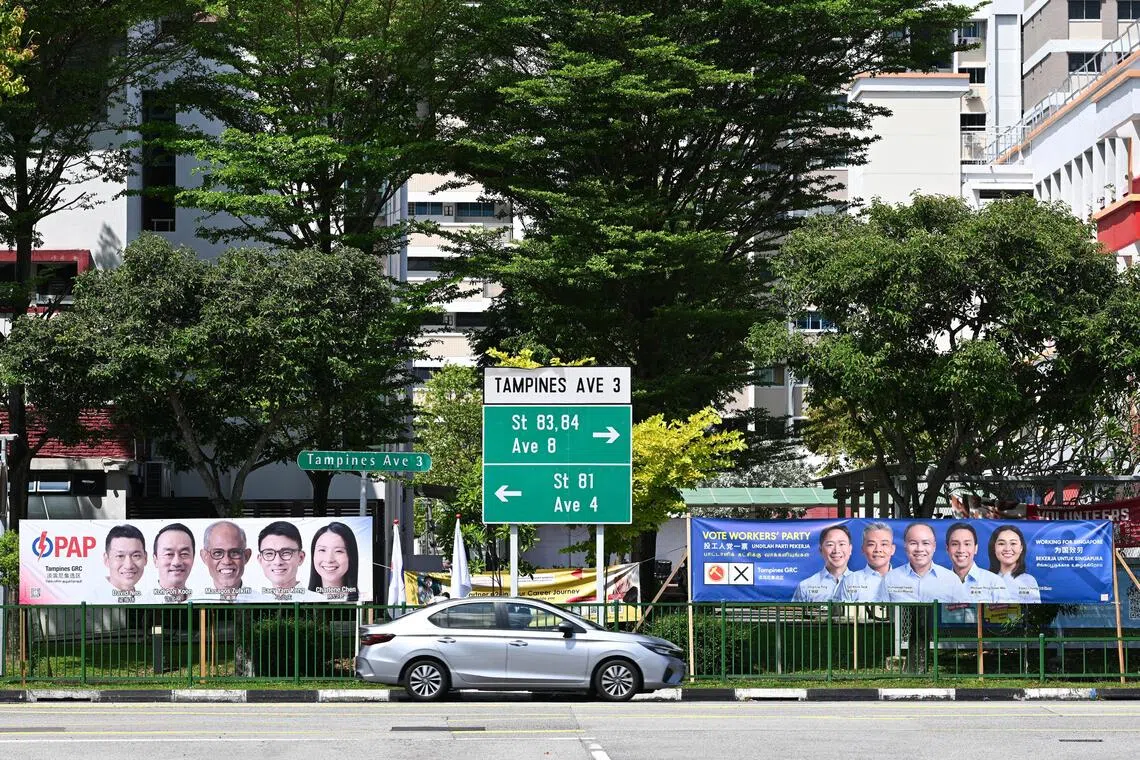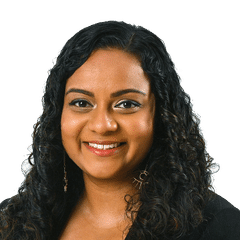Keep populism at bay, or there will be dire, lasting implications: Ong Ye Kung
Sign up now: Get ST's newsletters delivered to your inbox

Banners for PAP and WP candidates for Tampines GRC ahead of the 2025 General Election.
ST PHOTO: LIM YAOHUI
Follow topic:
SINGAPORE – In the face of emerging populist ideals globally, Coordinating Minister for Social Policies Ong Ye Kung has warned against politics that seek to divide, and called for populism to be kept at bay.
Singapore came “dangerously close to mixing race and religion” during the 2025 General Election, said Mr Ong, speaking in Parliament on day two of the debate on the President’s Address on Sept 23.
He recalled how, during GE2025, Prime Minister Lawrence Wong had to intervene in the midst of the hustings to remind political parties to keep race and religion out of the political space.
This happened after several foreigners had urged Singaporeans to vote along religious lines.
“If things had played out differently, there would have been dire and lasting implications for the unity, harmony and the very fabric of Singaporean society,” said Mr Ong in a 30-minute speech outlining several lessons from the election.
“Let’s not think Singapore is immune to populism,” he added, pointing out that in 2021 it had played out in that very Chamber.
The Progress Singapore Party (PSP) had alleged that Singapore’s Comprehensive Economic Cooperation Agreement with India had given professionals from India “a free hand” to work here, putting Singaporean professionals seeking employment at a disadvantage.
“It was a seductive and simplistic argument, which took on an ugly racial tone,” he recalled, with websites with xenophobic views emerging.
It required intervention from various ministers, like Mr Ong himself, who delivered a ministerial statement to clear the air on how free trade agreements work, and debated with the PSP.
“The best defence against populism is public rejection of it,” said Mr Ong, adding that this was what played out during GE2025.
“No party or candidate won any seat by proposing unsustainable social welfare programmes, tearing down institutions, or by stoking anti-foreigner sentiments.”
He noted, however, that “populism does not appear out of nowhere”, and it typically emerges from concerns among people over inequality in society, or excessive competition for jobs and space from foreigners.
Populists also tend to employ an “us versus them” framing, where one group is pitted against another, he pointed out.
“They gain support by presenting themselves as champions of the people, standing up against elites, institutions, or outsiders.”
Far-right populism is more common now, he said, and seen in places such as the US, Europe, Britain, Australia and Japan. It is often tied to immigration.
“Populism takes societies on the road to ruin, creating irreconcilable rifts between communities, and fuelling xenophobia and racism,” he added.
“Eventually, either their fiscal system goes broke or the society breaks apart.”
While the seeds of populism exist in every society, the question is whether they are allowed to take root and grow.
“Anyone who peddles soft, partial truths, and easy but incomplete solutions waters these seeds; anyone who refuses the hard cognitive work of formulating rational policies provides fertile ground,” he said.
It is imperative for the PAP government to be keenly aware of what Singaporeans may be concerned about, address these concerns early, openly and sensibly, and not let them fester and turn into something ugly that feeds populism, he stressed.
“We did that hard work during the last term of government, and we will continue to do so.”
Following Mr Ong’s reflections on the May general election, Leader of the Opposition and WP secretary-general Pritam Singh (Aljunied GRC) responded to several points in his clarifications, such as electoral boundaries and an opposition wipe-out.
Mr Ong, who is also Health Minister, had said the WP deliberately contested fewer than a third of the available seats during GE2025, adding that this was not for a lack of suitable candidates, but a “considered, strategic decision, reading the mood of the electorate”.
Mr Singh gave several reasons for this, including that the WP had only 1½ months between the release of the electoral boundaries report and Nomination Day to organise candidates. There was also the matter of dealing with new constituencies.
He also brought up the PAP’s abundance of resources to reach out to Singaporeans on a day-to-day basis. “So, the realities are quite different,” said Mr Singh. “But in spite of that, I take the minister’s point that Singaporeans want an alternative, and since they want an alternative, we do our best to present it to them.”
In response, Mr Ong said PAP MPs were “equally scrambling” when the report was released, adding that the ruling party also had to adapt to new constituencies.
Mr Singh also disagreed with Mr Ong’s reading that there was no possibility of an opposition wipe-out – a position the PAP had taken before the hustings.
In response, Mr Ong reminded Mr Singh of the opposition’s role in the governance of Singapore and how that has to be taken seriously, and to “accept there’s no chance of a wipe-out”.
“The people expect the WP to play an important role, and Singapore needs it to come up with alternative policies as the Barisan Sosialis did in the past with a small number of seats”, said Mr Ong.
He added that he hopes WP can “rise to the occasion”.
Mr Ong said: “Actually, life will be harder for (the) PAP. Contests will be so much more intense. People will be so much more discerning with who they choose. But I think it is the right political direction for Singapore.”


